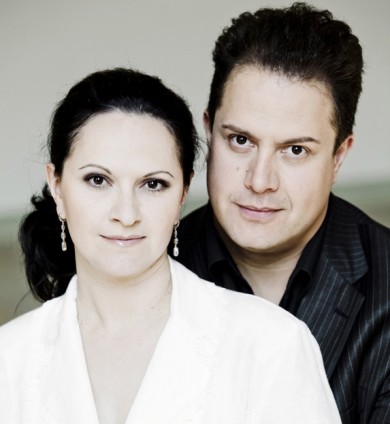Backstage controversy provided extra drama at Dranoff finals

Dranoff Competition artistic directors Aglika Genova and Liuben Dimitrov. Dimitrov vigorously protested last week to change the Dranoff rules to allow a fourth team into the finals.
This year’s Dranoff Competition was a nail-biter, as the finalist scores were closer than they’d ever been in the entire history of the competition. But the drama backstage wound up proving nearly as intense as the public performances.
The gold medal of the 12th Dranoff International 2 Piano Competition, a $25,000 prize, went to Duo Yamamoto, sisters Ayaka and Yuka Yamamoto, from Japan. South Korean team Duo Yoo and Kim, Yoon-Jee Kim and Jaekyung Yoo, took the $15,000 silver prize, and German team duo imPuls, Barbara and Sebastian Bartmann, took home the bronze prize, $10,000. Duo imPuls also swept the other awards, winning three performances prizes and a prize based on audience voting.
This year’s competition was notable because of the tight scoring and lack of a frontrunner, said Carlene Sawyer, executive director of the Dranoff Foundation.
“I don’t think anyone knew who were going to be the finalists,” said Sawyer. “None of us had any idea because the competition was by far the closest Dranoff competition we’ve ever had.”
Of the eight teams that competed in the Dranoff’s finals, four of these teams –Duo Ping and Ting, duo imPuls, Duo Yoo and Kim, and Duo Yamamoto—were neck and neck before the final round, said Liuben Dimitrov, one of the artistic directors of the competition.
Because of the close scores, Dimitrov wanted to allow all four teams to compete in the final round, in which teams perform a concerto with orchestra. Two of the finalist teams, Duo Ping and Ting and Duo Yamamoto—the winning team—study with Dimitrov and his wife and duo partner, Aglika Genova, in Germany.
“We thought maybe the rules should be revised a bit,” he said. “These four duos were so close to each other. The results were never so close in the history of the competition, and the artistry of these four teams was amazing at the highest level.”
“Unfortunately the rules of the competition do not allow us to let four finalists play with the orchestra,” said Dimitrov. “We called urgently a very large board meeting before the finals and asked if it was possible to handle the situation with more freedom.”
The meeting was in the form of a conference call with the board members who were available, said Maxine Long, the vice-president of the board. “Because it was very close we did have a discussion of whether to give an additional prize or recognition,” said Long. “As a World Federation competition we are very scrupulous about our rules. We had already confirmed that the rules didn’t allow the fourth prize.”
Carlene Sawyer, the executive director, was in an orchestra rehearsal during much of the call, but joined in at the end. “There was a mention that we could have four teams,” she said. “But the discussion was that no, it should stand the way it was,” she said.
Some of the discussion revolved around money, she said, since allowing Duo Ping and Ting to compete in the final round would have resulted in increased fees for the conductor and orchestra.
The Dranoff Foundation will hold the next competition in 2016. The artistic directors, Dimitrov and Genova, are writing a letter to the board, asking for the rules governing the finals to be different for next year, said Dimitrov.
Posted in News
Leave a Comment
Mon May 20, 2013
at 5:17 pm
No Comments
